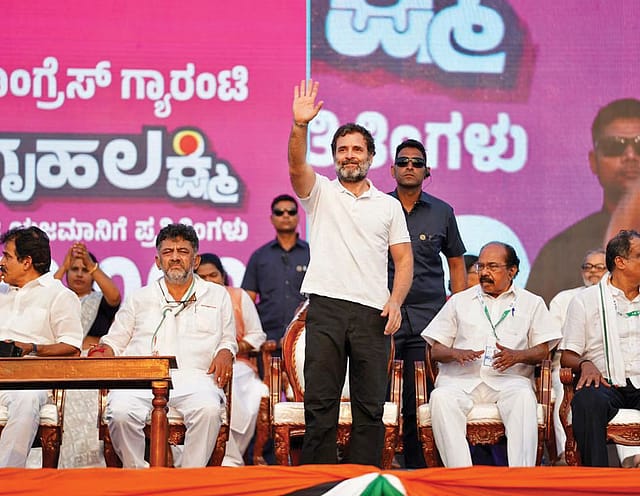Rahul’s Hard-Left Gamble

CONGRESS HAS TAKEN a hard-left turn under Rahul Gandhi. Is that politically astute? The hard-left is viscerally anti-business. Rahul's frequent diatribes against big business mirror the 1970s politics of George Fernandes who as industry minister in the Morarji Desai-led, post-Emergency Janata government threw Coca-Cola and IBM out of the country.
Do young people naturally lean left? Writing in Bloomberg Businessweek, evolutionary anthropologist Avi Tuschman answers the question by recalling the adage: "If you are not a liberal when you're 20, you have no heart. If you're not a conservative by the time you're 30, you have no brain."
He adds: "Variations of this saying have been attributed to Benjamin Disraeli, Otto von Bismarck, George Bernard Shaw, Woodrow Wilson, Theodore Roosevelt, Aristide Briand, and Winston Churchill. The thought though first came, in fact, from a French statesman, François Guizot (1787-1874). Regardless of its origin, the adage raises a fascinating question: Do the young really lean left because of passions and idealism? And as people age, do they incline toward the right because they become more realistic or cynical?"
Congress, however, could be misreading the national mood. India is an aspirational country. The average Indian doesn't dislike big business. She wants to be an empowered employee and one day, an entrepreneur herself.
2025 In Review
12 Dec 2025 - Vol 04 | Issue 51
Words and scenes in retrospect
India's first Prime Minister Jawaharlal Nehru was a Fabian socialist. He nationalised Air India in 1953 and told good friend JRD Tata that profit was a "dirty word".
Indira Gandhi took her father's socialism to another level. She nationalised all private banks and raised income-tax rates on the highest earners to 97 per cent. The black economy was born. Wealthy Indian businessmen quickly opened secret Swiss bank accounts.
Rajiv Gandhi had a more relaxed approach to business. He was an early techie, used a ham radio, and piloted Boeing 737-200 passenger jets for Indian Airlines from 1968 to 1980. Few realise that Rajiv was the first Nehru-Gandhi since Motilal Nehru to hold a professional job outside the family. Motilal, before politics drew him in, was a successful lawyer in Allahabad.
Jawaharlal, Indira, Sanjay, Rahul and Priyanka have never held professional jobs. Rahul did try his hand at entrepreneurship with an infotech company called Backops in early 2000, but it never took off. He joined politics in 2004, with Congress offering lifelong employment.
So, is Rahul's hard-left turn likely to help Congress in 2024? Rahul has added two ingredients to his political pitch. First, minorityism. Second, welfarism.
The Karnataka victory was built on these twin pillars. Muslims, who comprise 13 per cent of Karnataka's electorate, voted en masse for Congress, abandoning the Janata Dal (Secular). Welfarism meanwhile ensured Congress retained its core Hindu caste voter base.
If minorityism and welfarism can work in Karnataka, one of India's wealthiest states, why shouldn't it work nationally in 2024? The Congress leadership believes it can. Rahul is therefore under no pressure to move from a hard-left, minority-leaning, welfare-oriented position to the centre-left. That could prove a miscalculation.
Turn back to the psychology that governs human behaviour, including voter behaviour. Here's what Tuschman says about age, culture and ideology: "A 2004 study by psychologists Robert McCrae and Jüri Allik in the Journal of Cross-Cultural Psychology of 36 cultures across Africa, Europe and Asia discovered that openness and conscientiousness differ between 18 to 22-years-olds and older adults. If an individual's political personality hasn't changed by the time of his or her 30th birthday, however, it's not likely to differ all that much at 40, 50 or 60.
"This isn't to say that all teenagers are liberal and all older people are conservative. In any age group, people are distributed along the Left-Right spectrum on a bell curve. The entire curve, however, moves somewhat to the Right during the mid-20s. There is one life event, though, that greatly accelerates a person's shift to the Right, and it often occurs in the 30s: parenthood. Why does having kids push people to the Right? Parents look for possible sources of danger that nonparents can ignore. This shift in perception is so strong it creates an illusory sense of risk; new parents tend to believe that crime rates have increased since they had children even when actual crime has dropped dramatically. Because 'dangerous world' thinking is associated with political conservatism, parenthood pushes people to the Right, and more so when they have daughters."
In a politically conservative country like India, that could spell electoral trouble in 2024 for Rahul's hard-left gamble.
